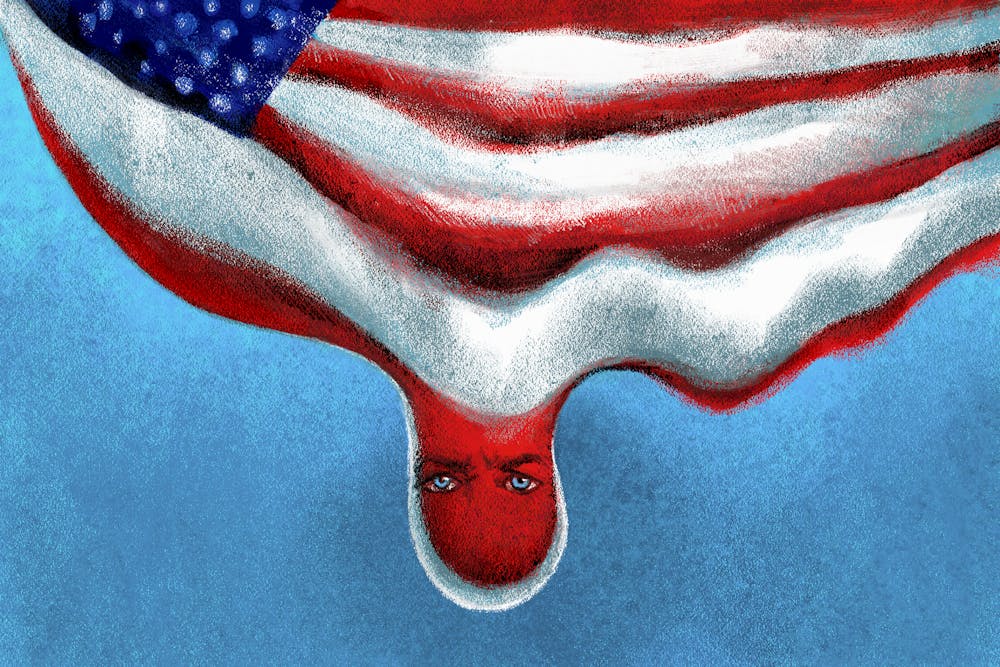USC students who are of voting age and American citizens (approximately 95%) will be eligible to vote in the presidential election this November and in 2028. These upcoming elections have the potential to change American politics.
The future of the conservative movement in America is at stake with the Donald Trump-JD Vance alliance that signals a continuation of the MAGA movement in 2024, 2028 and beyond. This shift has fundamentally changed the Republican party and American politics in aggressive ways.
As defined by Encyclopedia Britannica, populism “champions, or claims to champion, the common person, usually by favorable contrast with a real or perceived elite or establishment.” Populist policies typically depend on an anti-establishment narrative that appeals to a specific voter base, rather than being based on sound principles.
Since 2016, the Republican Party has seen a distinct split between traditional limited government, free market, conservative values and a new populist and protectionist wing under former president Donald Trump. These protectionist policies include high tariffs to protect domestic business. As it currently stands, vice presidential nominee Senator JD Vance is poised to take the lead of this Republican sect in 2028, particularly with a potential Republican victory in November.
Vance has quickly embraced Trump’s flamboyant persona and non-traditional policies. While not originally a Trump fan, the politics of the Republican party has led him down the MAGA path to power. As his vice president, Vance will be the likely choice for the Republican successor in 2028 if Trump serves a second term as president.
Vance is being accused by some of continuing in the populist and divisive footsteps of Trump, whose “New Right” movement promotes trade protectionism and strong economic initiatives from the federal government. Traditionally, free market ideals and liberty-focused conservatism have dominated the Republican party, but this is now shifting. Vance is entering the forefront of the party at a time of choosing between these two sides.

Dramatic shifts are not just a Republican party issue. This election cycle, the Democratic party is experiencing a sudden and unprecedented shift from career politicians such as President Joe Biden to younger, less experienced candidates such as Vice President Kamala Harris.
Harris has held national political office for seven years— just one term as senator and as vice president— compared to Biden’s 51 and former House Speaker Nancy Pelosi’s 37.
Harris’ policies also have tinges of populism. Her campaign is attempting to appeal to a broader voter base by adopting less traditional liberal policies, such as endorsing eliminating taxes on tips.
Policy changes aren’t the only shifts. Division has increased. Trump's persona and nature has made American political culture more polarized and aggressive. A study from Brigham Young University found that Trump accounted for 62.4% and 79.7% of “verbal aggression” during the 2016 Republican Primary debates and the general election debates, respectively.
In a striking correlation, a Pew Center poll found at least a 20% increase in the belief that members of the opposite party are “more close-minded, dishonest, immoral, and unintelligent than other Americans” between 2016 and 2022. This increase was seen in both Republicans and Democrats. Both former President Trump and President Biden have called each other the "most corrupt president" in American history.
Young voters should not be satisfied with this divide. It creates animosity between neighbors, coworkers and even family members. Even political violence has increased, resulting in events such as the Jan. 6 riot and two consecutive assassination attempts on former President Trump. Compromise has become an unfamiliar and uneasy word in political contexts.
While Trump and Harris made headlines for simply shaking hands, vice president candidates JD Vance and Tim Walz demonstrated to the country that while still imperfect, civil and respectful debate is still possible.
As he steps into the limelight, JD Vance has a choice. Will he step away from harsh rhetoric and look to unite the Republican party, or will he follow in Trump’s footsteps and run further still from conservative ideals and civil discourse?
While policy innovation is important, if the Republican Party is to be the party of liberty, the free market and American advancement, isolationist populism must go. It is up to young conservative voters to advocate for which direction the Republican Party should go and it is up to all young voters to oppose intentionally divisive politics in general.
When the Founding Fathers were debating whether or not to sign the Constitution, Benjamin Franklin said “the older I grow, the more apt I am to doubt my own judgment, and to pay more respect to the judgment of others.” This is a core American ideal that all should strive for; listen to the other side and consider their perspective instead of villainizing those across the aisle.
First time conservative voters have a choice between Trump's "New Right" and traditionalism in the coming years of the Republican Party through civic engagement. Young voters in particular, of all political affiliations, should not be satisfied with a singular agenda or baseless political rhetoric. Rather, they should push their parties to think critically, defend policies with facts and promote civil discourse across the aisle while upholding American ideals.

